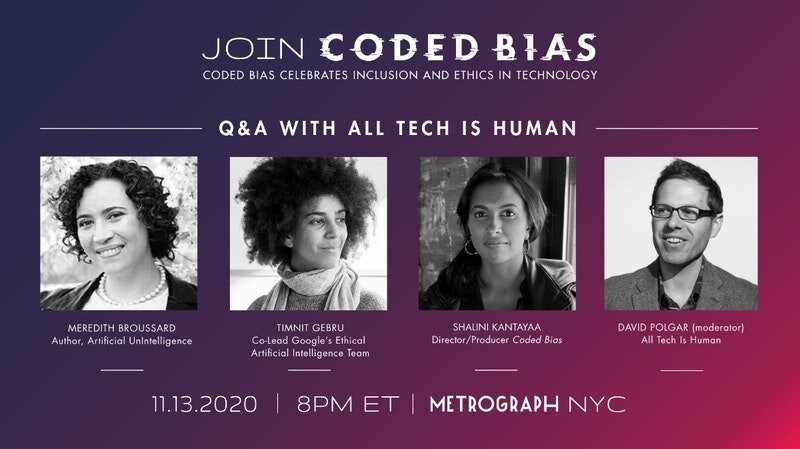Coded Bias, AI, and the Future of Civil Rights
All Tech is Human Series #6: with Shalini Kantayya, Meredith Broussard, and Timnit Gebru
Details from the original livestream event put on by All Tech is Human
Action Items & Takeaways
Considerations on activism in this space:
Check out the resources below mentioned by the guests! Get informed and educated!
Demand that algorithmic ethics classes are required for anyone who is getting a CS degree
These demands can come from faculty and also from undergraduate or graduate students!
People assume that including “ethics” means adding philosophy to these classes.. Which can be harmful
Don’t just include units on white male philosophy
Instead focus on disability studies, feminism studies, critical race theory, gender studies, etc…
Sign the declaration of data rights on the coded bias website (link below)
Considerations for influencing legislation on these topics:
Start with local legislation, then it can help tip the federal legislation
E.g., SF banning facial recognition, now it is going for the state ban in some places, maybe eventually federal ban
Local legislation can be harder, but you can actually achieve something and actually measure what you’ve achieved
Legislation creates culture shift, if you can just start to pass local legislation and bans, even at the university level (e.g., banning facial recognition on campuses), it sets a new norm and a precedent for the culture of that place
Stop allowing tech companies to regulate themselves (Meredith)
People who are not in position to make billions of dollars from the company should write the regulation for that company, not those who work on the inside already
Motivate these companies to be more ethical through business / PR pressure: e.g., if the company doesn’t make a general purpose facial recognition or gender classification software, they won’t have to redact it and waste their money like other organizations have done already
Responsible tech needs bridge builders, consider becoming one:
People who can translate the technical jargon to activists who can utilize it to make legislative change
People who can translate the social sciences to the technical in industry
People who can speak to both sides in their jargon, language, and cultural context / norms to make it happen!
Combat technochauvinism (the idea that tech is always the best solution):
Instead ask what is the right tool for the task? It might be computational, it might not be.
Recognize that when technological tools are created for solutions, they are often not created by the people who actually need the solution and are not made equally
Make more diverse teams creating technology, give more seats at the table to those who have historically not been welcomed
There needs to be a structural shift (Timnit). It’s not just about inviting diverse teams to create products (Women in power can still be sexist, people of color in power can still be racist), instead we have to create structural and cultural shifts to fix these problems as a community, rather than relying on “diversity” to fix it for us.
Talk to the stakeholders (not just consumers, but also the people who are evaluated by automated systems) before designing the technology to get their input!
Annotated Resources
Resources From Shalini Kantayya (guest speaker from this episode):
Twitter: @shalinikantayya
Resources From Timnit Gebru (guest speaker from this episode):
Twitter: @timnitGebru
Resources From Meredith Broussard (guest speaker from this episode):
Relevant Media & Organizations:
Declaration of data rights as human rights
Relevant Books to Explore this Space:
Artificial Unintelligence by Meredith Broussard
Weapons of Math Destruction by Cathy O’Neil
Algorithms of Oppression by Safiya Noble
Race After Technology by Ruha Benjamin
Technically Wrong: Sexist Apps, Biased Algorithms, and Other Threats of Toxic Tech by Sara Wachter-Boettcher
The Big Nine by Amy Web
Twitter and Teargas by Zeynep Tufekci
The Age of Surveillance Capitalism by Shoshana Zuboff
Do you have any more action items or takeaways that you’d like to share that are related to this topic? Any resources you’d like to include in this list? We’d love to hear from you! Feel free to leave your thoughts in a comment below (you can post your comment by hovering over the bottom-right corner of the comment box).
